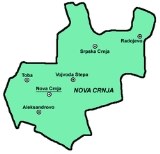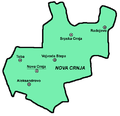
Radojevo
Encyclopedia

Radojevo is a village in Serbia
Serbia
Serbia , officially the Republic of Serbia , is a landlocked country located at the crossroads of Central and Southeast Europe, covering the southern part of the Carpathian basin and the central part of the Balkans...
. It is situated in the municipality of Nova Crnja
Nova Crnja
Nova Crnja is a village and municipality in Central Banat District of Vojvodina, Serbia. The village has a population of 1,858, while Nova Crnja municipality has 12,661 inhabitants.-Inhabited places:Nova Crnja municipality includes the following villages:...
, Central Banat District
Central Banat District
Central Banat District is a northeastern district of Serbia. It lies in the region of Banat, in the autonomous province of Vojvodina. It has a population of 208,456...
, Vojvodina
Vojvodina
Vojvodina, officially called Autonomous Province of Vojvodina is an autonomous province of Serbia. Its capital and largest city is Novi Sad...
province. The village has a Serb ethnic majority and its population is 1,385 people (2002 census).
Name
In SerbianSerbian language
Serbian is a form of Serbo-Croatian, a South Slavic language, spoken by Serbs in Serbia, Bosnia and Herzegovina, Montenegro, Croatia and neighbouring countries....
, the village is known as Radojevo or Радојево, in Hungarian
Hungarian language
Hungarian is a Uralic language, part of the Ugric group. With some 14 million speakers, it is one of the most widely spoken non-Indo-European languages in Europe....
as Klári, in German
German language
German is a West Germanic language, related to and classified alongside English and Dutch. With an estimated 90 – 98 million native speakers, German is one of the world's major languages and is the most widely-spoken first language in the European Union....
as Klari, and in Croatian
Croatian language
Croatian is the collective name for the standard language and dialects spoken by Croats, principally in Croatia, Bosnia and Herzegovina, the Serbian province of Vojvodina and other neighbouring countries...
as Radojevo.
History
Historically, the village was called Klarija, and before merging, there were two Klarija's: Srpska Klarija (SerbSerbs
The Serbs are a South Slavic ethnic group of the Balkans and southern Central Europe. Serbs are located mainly in Serbia, Montenegro and Bosnia and Herzegovina, and form a sizable minority in Croatia, the Republic of Macedonia and Slovenia. Likewise, Serbs are an officially recognized minority in...
Klarija) and Hrvatska Klarija (Croat
Croats
Croats are a South Slavic ethnic group mostly living in Croatia, Bosnia and Herzegovina and nearby countries. There are around 4 million Croats living inside Croatia and up to 4.5 million throughout the rest of the world. Responding to political, social and economic pressure, many Croats have...
Klarija).
In Hungarian sources these were called Szerbklári and Horvátklári (located in 20° 47' 21" E and 45° 44' 48" N), respectively.
Hrvatska Klarija got its name after Croatia
Croatia
Croatia , officially the Republic of Croatia , is a unitary democratic parliamentary republic in Europe at the crossroads of the Mitteleuropa, the Balkans, and the Mediterranean. Its capital and largest city is Zagreb. The country is divided into 20 counties and the city of Zagreb. Croatia covers ...
n settlers (nobles that originated from Turopolje
Turopolje
Turopolje is a region in Croatia situated between the capital city Zagreb and Sisak. The administrative center of the region Turopolje is the town of Velika Gorica.-Overview:...
), that were settled there by the Diocese of Zagreb on its possessions (see Hrvatska Keča, Hrvatski Čenej). These Croats lived in compact part of the village; they have been slowly but evidently in large amounts assimilated. Still, this assimilation hasn't drawn the attention of Croat parties in Serbia.
The village changed its name after the WW2 and there is an initiative to give to the village its original name Srpska Klarija.
Historical population
- 1900: 3,107
- 1931: 3,336
- 1961: 2,595
- 1971: 2,230
- 1981: 1,872
- 1991: 1,588

